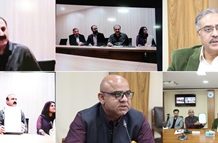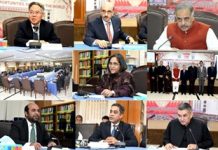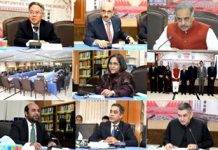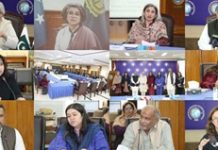Press Release
ISSI in Collaboration with Lightstone Publishers Hosted “9th Adab Festival Pakistan”
December 22, 2024
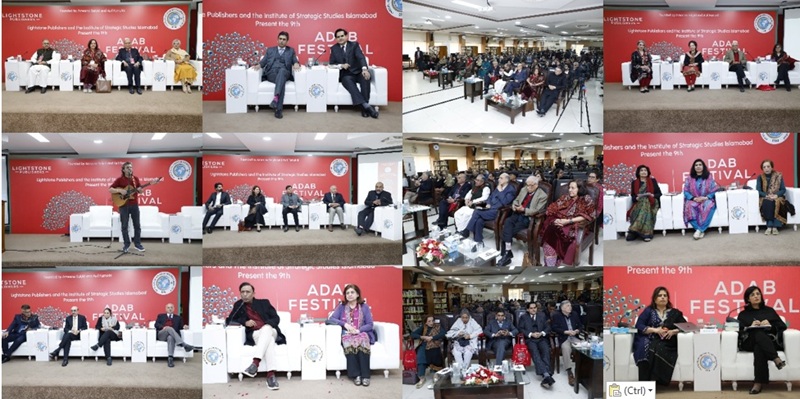
The 9th “Adab Festival Pakistan”, hosted by the Institute of Strategic Studies Islamabad (ISSI) in collaboration with Lightstone Publishers, had an engaging daylong sessions highlighting the role played by literature in building a harmonious society.
In his welcome remarks, DG ISSI Ambassador Sohail Mahmood emphasized Pakistan’s literary richness and ISSI’s commitment to fostering creativity through literature. He highlighted the Adab Festival’s role in promoting book reading, especially among youth, as a vital balancing factor in the digital age. Ambassador Sohail Mahmood lauded the festival as a platform to celebrate cultural pluralism, inspire dialogue, and explore creative ideas. He commended the festival’s diverse program, featuring book talks and discussions on topics such as Quaid-e-Azam’s vision, women empowerment, and education, showcasing its potential to inspire new perspectives. The event, he noted, serves as a bridge between emerging and established writers, fostering connections and nurturing literary aspirations. Ambassador Sohail Mahmood expressed gratitude to the participants and encouraged attendees to engage with the sessions, underscoring the festival’s power to connect, educate, and celebrate the enduring impact of words. He also affirmed ISSI’s resolve to systematically project Pakistan’s soft power inherent in its rich culture and arts and literature in active collaboration with literary institutions and civil society.
In her introductory remarks, Ms. Ameena Saiyid highlighted the transformative power of literature festivals in honoring writers, researchers, and poets, while addressing societal challenges and reinforcing cultural identity. Dr. Najeeba Arif, Chairperson Pakistan Academy of Letters, emphasized literature’s role in fostering humanity, hope, and soft power, stressing its influence in shaping a nation’s cultural and intellectual landscape. The session laid the foundation for a festival that celebrates creativity, intellectual exchange, and meaningful dialogue, underscoring the significant role of literature in societal progress.
The first session of the Adab Festival, titled “Jinnah’s Vision for Pakistan – A Call for Action,” featured insightful remarks by Barrister Yasser Latif Hamdani, author of the book, and was moderated by Professor Dr. Ilhan Niaz. Barrister Hamdani emphasized Jinnah’s role as a key legislator in Pakistan’s formation, contrasting his inclusive vision with Gandhi’s focus on religion in politics. He clarified that Jinnah envisioned a state, promoting harmony among diverse communities while fostering a modern Muslim society grounded in its religious roots. Hamdani dispelled misconceptions, stressing that Jinnah’s vision was not for a theocracy, but for a progressive Pakistan based on equality, justice, and tolerance. The session highlighted the need to realign contemporary discourse with Jinnah’s ideals, advocating for a more inclusive and harmonious society.
The second session of the Adab Festival, titled “Leadership and Legacy,” featured an engaging discussion with Dr. Maleeha Lodhi, Mr. Zahid Hussain, and Ms. Arifa Noor, moderated by Dr. Salma Malik. Mr. Zahid Hussain stressed the importance of history for the younger generation, reflecting on Pakistan’s challenges and sharing insights from interviews with figures like Khan Abdul Ghaffar Khan and Rajiv Gandhi. Dr. Maleeha Lodhi highlighted unlearned lessons from history; missed opportunities in land reforms, education etc.; and the role of individuals in shaping history. Ms. Arifa Noor explored the evolution of political leaders and the need for balanced journalism to capture complex realities. The session offered a thought-provoking exploration of Pakistan’s leadership, historical trajectory, and the lasting legacy of key figures and institutions.
Following an inspiring Sufi performance by Arieb Azhar, the third session of the Adab Festival, titled “Reimagining Education: New Frontiers and Opportunities,” moderated by Mr. Musharraf Zaidi, focused on critical challenges and innovative solutions in the education sector. Mr. Shakeel Durani highlighted illiteracy as a central issue, advocating for community schools and emphasizing that just Rs. 15 billion annually could enroll 26 million out-of-school children. He also called for technology and policy interventions in remote areas. Mr. Ehtesham Anwar stressed the need to prioritize education and address overpopulation and systemic issues. Ms. Uzma Yousuf highlighted the role of parents, economic relevance in education, and the importance of teacher training. Mr. Hassan Khan advocated for a shift towards Education 5.0, incorporating AI, augmented reality, and project-based learning to equip students with future-ready skills, urging a collective responsibility for systemic transformation.
The fourth session of the Adab Festival, titled “Her Story, Her Voice: Celebrating Women’s Empowerment,” moderated by Ms. Maliha Hussain, explored themes of activism, optimism, and collaboration. Dr. Fouzia Saeed, the author of the book, emphasized the need to highlight positive advancements in the country to foster a sense of hope. She shared insights from her book’s executive summary, discussing seven key strands of change over the last two decades: Political Awakening, Social Welfare, Political Collaboration, Reactive Confrontation, Development Orientation, Strategic Activism, and Virtual Activism. Ms. Fazila Aliani reflected on her tireless advocacy for Balochistan, calling for political collaboration and collective action to drive progress. She underscored the importance of empowering women and working together for the greater good of the nation. The session highlighted the pivotal role of women in shaping social, political, and cultural change, reinforcing the importance of their voices in driving societal transformation.
The fifth session, titled “Pakistan and the Changing Global Scenario,” moderated by Mr. Omayr Aziz Saiyid, focused on Pakistan’s strategic positioning amid global power shifts. Senator Mushahid Hussain Sayed discussed the “Asian Century,” emphasizing Pakistan’s “tactical” ties with the U.S. and “strategic” partnership with China. He called for political reconciliation and a strong counter-terrorism strategy. Ms. Nasim Zehra highlighted the importance of Pakistan-China relations, internal reforms, and Pakistan’s diminishing priority for the UAE and KSA. Ambassador Masood Khan examined the U.S.-China competition, trade ties with the U.S., and the need to recalibrate relations with China. He also stressed the importance of investing in regional ecosystems, including Central Asia, Iran, and MENA region, to ensure Pakistan’s strategic growth. The session provided valuable insights into Pakistan’s evolving role in a rapidly changing global environment.
The sixth session of the Adab Festival, titled “Indus Valley, Mysticism, Folk Traditions,” moderated by Mr. Tariq Bhatti, explored the region’s rich cultural and spiritual heritage. Ms. Sarwat Mohiuddin emphasized the interconnectedness of culture, humanity, nature, and folk traditions, highlighting the need for a deeper connection with nature for the well-being of humanity. She identified intolerance as a major challenge, stressing the importance of embracing diverse cultures and perspectives to promote peace and harmony. Mysticism, particularly Sufism, was presented as a path to self-awareness, equality, and universal compassion, reflecting the messages of folk literature.
The Adab Festival concluded with a discussion on Dr. Sania Nishtar’s book, Delivering Welfare at Scale: Ehsaas 2047, moderated by Ms. Amna Rizvan Ali. Dr. Sania Nishtar outlined the Ehsaas initiative as a transformative effort to develop Pakistan as a welfare state, addressing key areas such as education, health, poverty alleviation, and food security. She pointed to political patronage, transparency issues, and resistance from traditional politicians opposed to the program’s digital delivery mechanism as significant obstacles. Dr. Nishtar emphasized that Ehsaas reflected the struggles of those facing poverty, hunger, and inflation, particularly highlighting the role of the underprivileged, including 1.2 million exploited street vendors, in Pakistan’s economy. As the program’s impact became visible, she pointed out, border support among political segments and across institutions was also forthcoming. The session underscored the importance of welfare programs in addressing the needs of Pakistan’s most vulnerable populations.




